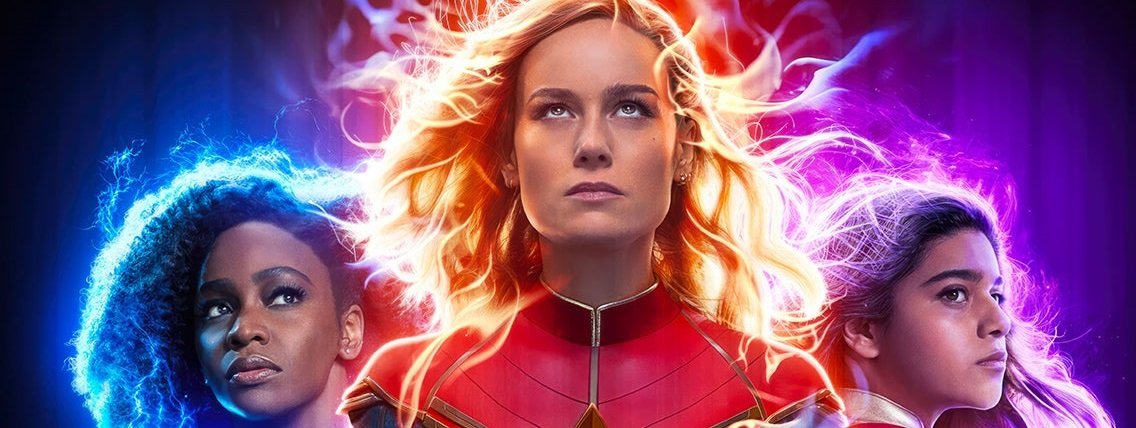The Marvels review – An indicator of obvious decline
Director: Nia DaCosta
Writers: Nia DaCosta, Megan McDonnell, and Elissa Karasik
Stars: Brie Larson, Teyonah Parris, Iman Vellani, and Zawe Ashton
Running Time: 105 minutes
Please note there may be spoilers below.
The three female leads of The Marvels are wonderful. As sign-posted by the unfairly maligned girl-power scene in Avengers: Endgame, having three female leads in a $270 million dollar blockbuster is a step in the right direction, if a lately plotted one. It’s a shame the enormous and over-compensated human machinery of the Marvel Studios empire have simply fumbled the task of placing them in a story that illustrates their talents. As we watch the effective charisma of each performer fly across the screen, we’re assaulted with an abundance of dull, gentrified storytelling from a studio suffering from it’s own success.
When Captain Marvel was released in 2019, it grossed over $1 billion worldwide on a budget somewhere north of $150 million. It was an extraordinary act of profit, supported by 3 things: a 90s period setting that promoted nostalgia and set it apart from its contemporaries; a balanced story focusing on the single point of interest, Marvel’s first female superhero; and lastly, its exquisite release timing between the 2 heaviest hitters in the Marvel canon, Avengers: Infinity War and Avengers: Endgame.
Now in an attempt to recapture the glory of that financial year-of-our-lord, Marvel have spent an eye watering $270 million giving us an over-produced mess that’s been edited into oblivion. The gimmick is the magical tethering of 3 heroes, who are bound together by an unwelcome ability to interchange locations when the use their crashy-bashy powers. Why this occurs is so unimportant to the film that it almost has no inherent story logic. You can hear a screenwriter’s breathy whisper, ‘Just go with it.’ The gimmick is a fun, if limited idea, giving us some playful sequences where teleporting to each other’s positions is deeply inconvenient, such as when Captain Marvel (Brie Larson) is flying and switches places with the delightful Ms. Marvel (Iman Vellani), who can’t fly. The ensuring chaos provides plenty of opportunity for Marvel’s trademark quips.
Of course, there is the villain, played by Zawe Ashton, whose sole goal is to find a Macguffin, two arm clasps called the Quantum Bands (just go with it). What’s immediately worrying about The Marvels is how generic it’s opening sequences are – the lost Macguffin, the power hungry villain, the crashy-bashy powers from people’s arms, the sense of constant undercutting of serious emotions; this is a very worn path for Marvel, who previously had a knack for shaping their stores around genre variations (political thriller, horror, buddy comedy, heist). But in The Marvels the story, the time, the place feel oddly shapeless. As our powerful ladies face the trails and tribulations of the plot, we’re left without a sense of cinematic substance underpinning the proceedings.
At one point some genuine moral ambiguity is raised when villain Dar-Ben (Ashton) reveals Captain Marvel destroyed her homeland, rendering it a sunless, starving society. It’s an interesting character inversion, but sadly for what little complexity is raised, it only takes this movie a single shot of Captain Marvel reigniting a sun to remove all nuance. Indeed, Marvel prefers their morality black and white.
Now this could all be acceptable if the movie managed to achieve the type of bombast of its predecessors, but I regret to say director Nia DaCosta feels passionless with her story. So little of it visually stands out. With its flat, dimensionless depiction of space, it’s character-less cinematography, The Marvels has a troubling lack of personality. There is so little risk-taking. In a key action scene, a Skrillex/Missy Elliott/Mr. Oizo dance track is needle-dropped to rob any sense of tension – the use of chart music almost an admission of guilt that this story is not emotional, but rather a music video of empty ascetics that are on their own sub-par.
The editing also isn’t seamless. It has the feeling of too many cooks the kitchen, of multiple tonal shifts that may work in isolation but don’t work in totality. Rather than an artistic vision, the result is a stapled together series of set pieces brought to you by McDonalds and Coca Cola, a movie laced with the sweaty pandering hands of studio executives struggling to make a release date.
It’s a shame, for the talent of the leads shines through. Brie Larson is as captivating as ever, pushing through a Christopher Reeve/Superman sense of inner contradiction. She mixes human vulnerability and titanic superpowers to great effect, but she’s working with material so tonally incapable of giving her the scenes to make that vulnerability clear. Instead the editing will jump her from God-like to comedic relief without reason. It’s infuriating to watch someone so talented be given so little to emote, like asking a martial artist to shoot a gun and walk off screen.
There’s also a Marvel shaped elephant in the room. In order to fully understand the origin of this story, you’d need to have previously watched 1 feature film (Captain Marvel) and 3 television series (WandaVision, Mrs. Marvel, and Secret Invasion). It’s an ungodly expectation to put on a global audience. Prior to the establishing of Disney+, the expectation of audience knowledge was reasonable – if you hadn’t seen the previous feature films, it’s fair to say each theatrical release worked hard to get you up to speed. The Marvels is, safe to say, the first Marvel feature I’ve watched where I felt out-of-the-loop because I hadn’t done my allocated homework. Disney+’s thirst for new content created this problem, and I’m confident in saying it won’t resolve it.
